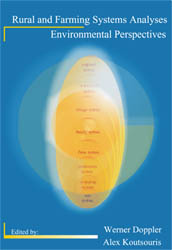
Rural and farming systems analyses - Environmental perspectives

The proceedings of the 3rd European IFSA Symposium (held in Hohenheim, Germany) were edited by Werner Doppler and Alex Koutsouris and published in 1999 at the Markgraf Verlag (ISBN 3-8236-1320), 382pp.
Table of content
Theme 1:Concepts and approaches for integrating environmental perspectives.
This chapter focuses on the methodology in farming and rural systems research and development. The intention is to bring discipline-oriented concepts and approaches together and discuss their potential of integration to describe and define more complex approaches. Special consideration should be given to the linkages in a hierarchy of systems (e.g. farming and rural systems), and to quantitative and qualitative approaches and concepts of evaluation of environmental systems. The disciplines involved could be such as soil sciences, agronomy, forestry, livestock, environmental sciences, micro and macro economics, social sciences, geography, land use planning, regional sciences and anthropology.
Theme 2:Management strategies for coping with the environment. Management strategies which include the interests of the individual families as well as the goals of societies will have to be discussed in the context of environmental needs. This requires the definition of environmental needs and possible conflicts with other objectives. It will have to deal with the different levels of actions and benefits such as the family, the community and the region and with different decision making bodies. The question is, whether different research disciplines and different decision-making bodies apply different strategies towards the environment and whether there are differences between men and women. And how the strategies can come closer together.
Theme 3:Use of local resources for rural development.
Sustainable rural development requires proper use of local resources. Farm resources, natural resources and social resources may change over time with regards to their availability, their quality and their local values. How can we make better use of these local resources in the context of environmental stability? What is the contribution of organic or environmentally adapted farming? Special reference should be given to the relations between land and environment, capital and environment and labour resources and cultural perception including gender differences. Different disciplines are invited to contribute to an overall understanding of the use of local resources.
Theme 4:The role of institutions in managing ecosystems.
Local, national and international (e.g. European Union) institutions can influence ecologically sound farming and rural systems development. To what extent have policies incorporated environmental objectives and how does policy contribute to the management of ecosystems? Which role play environmental aspects in extension services (e.g. in Central and Eastern European Countries)? In addition, this workshop will deal with regulations in resource use, land tenure (investments depending on socio-cultural settings, privatisation), state and project interventions, joint learning and collective actions (social action to deal with the environment, learning to manage ecosystems). How can this knowledge be used in training and teaching activities?
Theme 5:Farming and rural systems in zones of transitions.
Overuse, inadequate use or even unused resources influence the environment and the socioeconomic development in rural areas. This is especially pronounced in land use in marginal areas. Overuse of land through farming activities in e.g. mountains, forests, inadequate farming practices as well as reduction of (unprofitable) farming with increasing unused land may lead to environmental problems resulting in loss of fertile land, loss of areas for recreation and tourism, degradation and loss of high quality resources for rural and urban households (e.g. drinking water) and even loss of biodiversity.
